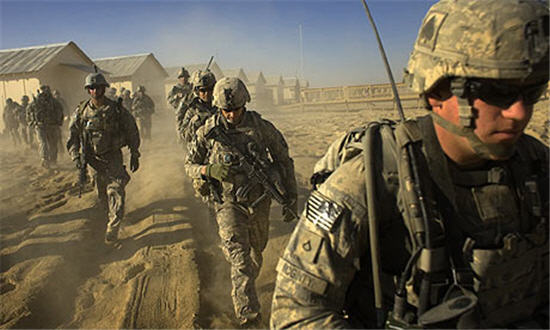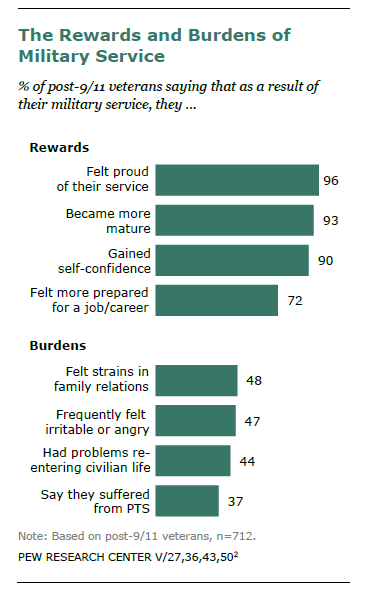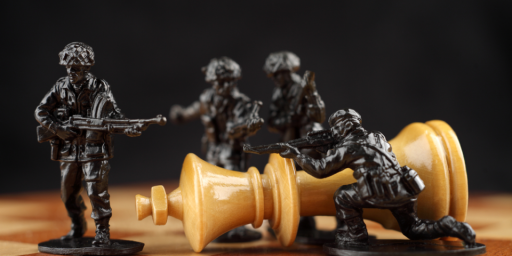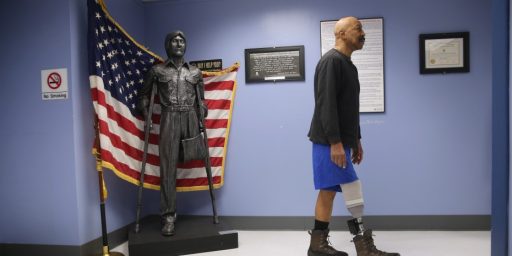1 in 3 Iraq and Afghanistan Vets See Wars as Waste
One in three U.S. veterans of the post-9/11 military believes the wars in Iraq and Afghanistan were not worth fighting.
“One in three U.S. veterans of the post-9/11 military believes the wars in Iraq and Afghanistan were not worth fighting, and a majority think that after 10 years of combat America should be focusing less on foreign affairs and more on its own problems, AP‘s Robert Burns reports (“Poll: 1 in 3 Vets Sees Iraq, Afghan Wars as Wastes“).
This is the finding of an exhaustive survey by the highly regarded Pew Research Center (“War and Sacrifice in the Post-9/11 Era: The Military-Civilian Gap“).
As the United States marks the 10th anniversary of the longest period of sustained warfare in its history, the overwhelming majority of veterans of the post-9/11 era (96%) are proud of their military service. At the same time, more than four-in-ten (44%) report that they have had difficulties readjusting to civilian life, and 37% say that – whether or not they have been formally diagnosed – they have suffered from post-traumatic stress. While post-9/11 veterans are more supportive than the general public, just one-third (34%) say that, given the costs and benefits to the U.S., the wars in Afghanistan and Iraq have both been worth fighting.
The nation’s post-9/11 wars have been fought by an all-volunteer active-duty military made up at any given time of just one half of one percent of the U.S. population. More than eight-in-ten (84%) of these modern-era veterans say the American public has little or no understanding of the problems that those in the military face. Most of the public (71%) agrees. Many Americans also acknowledge that since the 9/11 attacks, the military and their families have made more sacrifices than the public at large. But even among this group, only 26% say this gap is “unfair,” while 70% say that it’s “just part of being in the military.”
What’s interesting about these findings is that those who fought in these wars are actually more enthusiastic about them than the public at large.
- Veterans are more supportive than the general public of U.S. military efforts in Afghanistan and Iraq. Even so, they are ambivalent. Just half of all post-9/11 veterans say that, given the costs and benefits to the U.S., the war in Afghanistan has been worth fighting. A smaller share (44%) says the war in Iraq has been worth it. Only one-third (34%) say both wars have been worth fighting, and a nearly identical share (33%) say neither has been worth the costs.
- About half of post-9/11 veterans (51%) say relying too much on military force creates hatred that leads to more terrorism, while four-in-ten endorse the opposite view: that overwhelming force is the best way to defeat terrorism. The views of the public are nearly identical: 52% say too much force leads to more terrorism, while 38% say using military force is the best approach.
- About six-in-ten post-9/11 veterans (59%) support the noncombat “nation-building” role the military has taken on in Iraq and Afghanistan. The public and pre-9/11 veterans are less enthused. Just 45% of both groups say they think this is an appropriate role for the military.
- While nation building gets mixed reviews, large majorities of veterans and the public support the use of unmanned “drone” aircraft for aerial attacks in Iraq, Afghanistan and elsewhere. Nearly nine-in-ten (86%) veterans of all eras say this is a good thing; 68% of the public agrees.
- Both the public and veterans oppose bringing back the military draft. More than eight-in-ten post-9/11 veterans and 74% of the public say the U.S. should not return to the draft at this time.
The first breakdown is a bit of a head-scratcher. Half say Afghanistan was worth it and a healthy 44% say the same of Iraq. Yet, only 34% say both were worth it. This means that 10% of those who think Iraq was worth fighting think Afghanistan wasn’t!
The profile of those currently serving on active duty is of interest, too:
- The military in the post-9/11 era is older than the force that served a generation ago. While about two-thirds of active-duty military personnel are ages 30 or younger, the average age of enlisted personnel and officers has increased significantly since the draft ended in 1973.
- The percentage of minorities in the ranks of enlisted personnel and officers has increased significantly since 1990. In 2009, more than one-third of all active-duty personnel were minorities (36.2%), an increase from 25.4% about two decades ago. Women also comprise an increasing share of all active-duty officers and enlisted personnel.
- Today’s enlisted personnel are better educated than those who served before them. Fewer are high school dropouts and more are college graduates. In 2009, 92.5% of recruits were at least high school graduates, compared with 82.8% of comparably aged civilians.
- At a time when marriage rates are declining in the broader population, the share of active-duty military personnel who are married has increased dramatically in recent decades. Today, a majority of all enlisted personnel are married (53.1%), up from 40.1% in 1973. Overall, those in the military are significantly more likely to be married than are civilians of a comparable age.
As to the larger question raised by the survey, that the sacrifices of these wars is falling entirely on a tiny, self-selected segment of society, I addressed that at length in “Civilian Control, Not Citizen Soldiers,” an essay for The American Conservative back in April. All manner of dangerous, necessary jobs fall on those who have volunteered to take them on. While there are unhappy social consequences of this fact, it’s far outweighed by the professionalism of the modern force and simply the nature of specialization and division of labor of a modern economy.







This comes as absolutely no surprise. now let’s find a way to exit w/o losing too much face.
someone should tell those ingrates that theyre fighting for our freedoms. anti-american bastards.
Further, we need the right people for these types of demanding jobs. Beyond other attributes, such as physical fitness, military folks need to have the appropriate attitude toward the types of jobs that the military does. Many, probably most, Americans don’t have that attitude. Others are disqualified in other ways. By the way, this applies to many other jobs, too, but we’re talking about the military here.
The idea that the job of the military needs to be shared by everyone is laughable, ludicrous and counter-productive to having an effective military force. Most folks just aren’t qualified to do the job, one way or another. Shoot, I was barely qualified for the physical demands of the military, which were much more lax back in the day, when I was an 18-year-old joining the Navy shortly after the draft ended, than they are today.
If Americans regard military service as a sacrifice, then they’ve just shown they don’t understand one of the most basic things about the United States’ military people. The best way I can describe it is with personal experience. When people thank me for my career Navy service (lo those many years ago), I respond that thanks is appreciated, but it was my honor to serve.
To emphasize my point for the slow-witted: military service in the US isn’t a sacrifice; it’s an honor.
Jon Stewart had something trenchant to say in the article I cited in Doug’s piece about the PTSD treatment (Christopher Buckley, Jon Stewart, Live at the USO). Of our troops who were sent to those faraway places for obscure and dubious reasons, he said:
I does seem odd that so many people in the military would get married or be married when they volunteered…and then turn around and complain about the stress military service places on their family.
It’s like fishermen complaining about getting wet.
@ponce: Nice unsubstantiated claim, ponce. Please point out where married military folks are “complain[ing] about the stress military service places on their family.” I daresay I spend a lot more time around miltiary folks than you do, and I don’t hear this hypocrisy you cite, so please educate me.
By the way, it’s one thing to respond with “Yes” when asked if military service puts stress on their families, but quite another to state it as a complaint. You’d have to be an idiot not to believe that military families are not under more stress than average.
So if you’re going to accuse married service members of hypocrisy on this point, please support your claim.
I haven’t heard many complaints but have heard some. A common denominator seems to be when husband and wife are both serving in the military. I’d honor both spouses for their service but having both serving while having multiple children is a recipe for disaster and one they freely stepped into.
The same goes for the old canard of military members receiving welfare. People are often appalled by the idea but seriously, an E-3 with four kids is going to qualify. I don’t want to be all high and mighty but that’s just poor decision making.
As for the crux of the post, I was all for Afghanistan and steadfast against Iraq. And I never dreamed Afghanistan would last as long as it has.
@Davebo: Sure, there are going to be some complaints, and there’s going to be some lousy decision-making. But ponce doesn’t qualify it as “a few” military folks, or even “some,” since that would be a pointless comment. He casts a broad net with baseless claims, which is why I called him out on it and asked him to put up or shut up.
“While there are unhappy social consequences of this fact, it’s far outweighed by the professionalism of the modern force and simply the nature of specialization and division of labor of a modern economy.”
You’re forgetting the pretty clear political/cultural consequence of combining a volunteer force with a huge military, the development of a pseudo-macho elite who lack any appreciation of or connection to the demands and sacrifices of military services or the moral and practical seriousness of the use of force.
If you have a relatively small military, taking on something like invading Iraq demands a huge redirection of national resources and national will. If you’ve got a big military but everybody serves, there’s a reservoir of both knowledge and moral authority that makes it more likely significant opposition to military misadventures will develop among the general public and elite policy makers. A big military with an all volunteer force becomes a toy for limp wristed “masters of the universe” to act out their Rambo fantasies.
Mike
Um. Boyd,
It’s listed as the number one burden(46%) in the survey cited in the original post.
I guess we’re having a disconnect in terminology, ponce. Calling it a complaint seems to me to be much more pejorative than the acknowledgment that it’s a burden in response to a survey.
That’s quite possible, Boyd.
I was just surprised that over 50% of active-duty military personnel are married, specifically because military life seems so incompatible with married life given our current commitments.
To me these numbers imply a lot of family men and women are joining the military because of financial necessity, not for the honor of serving.
@ponce: My completely unscientific (yet experienced) take is that a spouse serves as an anchor in a highly dynamic environment unlike most others commonly experienced by young adults.
@ponce: Also, my perception (which may be dated, but I believe is still valid today) is that most married military folks entered the service single.
“A big military with an all volunteer force becomes a toy for limp wristed “masters of the universe” to act out their Rambo fantasies.”
Bravo.
If this were not true, we wouldn’t be where we are today.
@Fog: While I’m sympathetic to this intellectually, I’m not sure it’s borne out historically. After all, we did Vietnam and Korea during a time when conscription was the norm.
@Boyd- The wife and I are part of a local informal network that aids service families in need. The wives do complain quite a bit about what is going on. The pace of deployments and training plays havoc with some of them. Sick or troubled kids push a lot of them over the edge. We have several families in the area who have been left alone after the spouse committed suicide. They may not complain much in public, but we hear quite a bit in private.
Steve